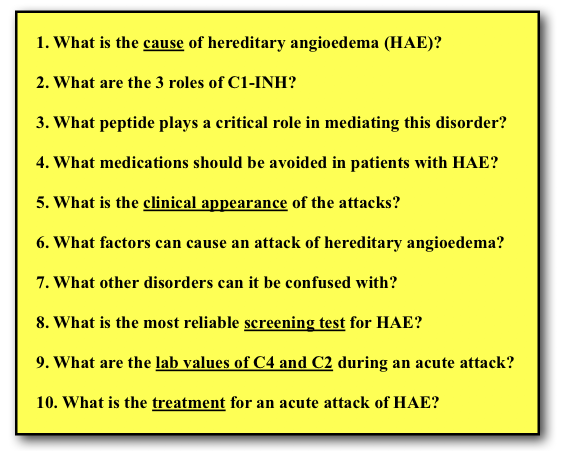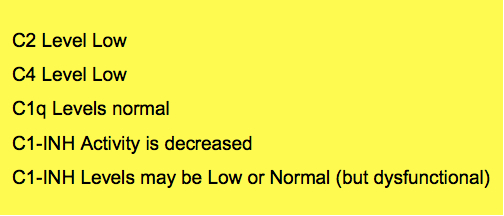Hereditary Angioedema
Check out this short video which clearly illustrates some important facts about hereditary angioedema.
How many of these Top 10 "High-Yield" questions can you answer?:

1. What is the cause of hereditary angioedema (HAE)?
It is an autosomal dominant disorder where there is either a deficiency or qualitative problem with C1 Esterase Inhibitor (C1-INH).
2. What are the three roles of C1 Esterase Inhibitor?
- C1-INH is a plasma inhibitor of C1r and C1s, the activated proteases of the first component of the classical complement cascade.
- C1-INH is an inhibitor of activated factor XII (Hageman factor), the first protease in the intrinsic clotting cascade.
- C1-INH is one of the major inhibitors of plasma kallikrein, the protease that cleaves kininogen and releases bradykinin.
3. What peptide is thought to play a critical role in mediating this disorder?
Bradykinin is a potent vasodilator that also increases vascular permeability which leads to a rapid accumulation of fluid in the interstitial tissues. Inhibiting bradykinin has been shown to alleviate the symptoms of HAE.
4. Pharmacology integration: What medications should be avoided in patients with HAE?
Medications which increase bradykinin such as ACE inhibitors have been shown to induce attacks.
5. What is the clinical appearance of the attacks?
Attacks most commonly involve the skin (face, extremities and genitalia), gastrointestinal tract, and respiratory tract and last for several days.
Attacks are characterized by episodes of nonpruritic, nonpitting edema of the skin most commonly involving the face and hands. This edema can be quite intense and disfiguring especially when it involves the face as you can see in the video below.
Edema can also occur in the GI tract producing abdominal pain, nausea, and vomiting and may lead to unnecessary surgeries.
Involvement of the larynx can be life threatening since the laryngeal edema can lead to asphyxiation.

6. What factors can cause an attack of hereditary angioedema?
Precipitating factors of hereditary angioedema (HAE) attacks include:
- trauma (especially dental work)
- medical procedures
- anxiety and emotional stress
- menstruation
- infection
- alcohol
7. What other disorders can it be confused with?
The symptoms may resemble those of allergy which may lead to a delay in diagnosis. An important feature distinguishing HAE from allergy is that HAE fails to respond to antihistamines or steroids.
8. What is the most reliable and cost-effective screening test for HAE?
The most reliable and cost-effective screening test is C4 level.
9. What will be the laboratory values of complement C4 and C2 during an acute attack?

10. What is the treatment for an acute attack of HAE?
Intravenous C1 esterase inhibitor concentrate.
Thanks to Dr. Ania Gapeleh